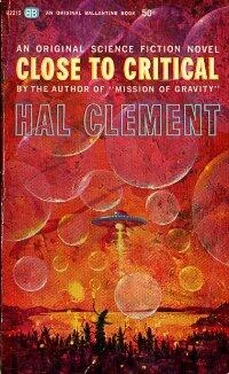“How far from the sea is that camp?” he queried.
“About two miles from the daytime coast line.”
“How about the night one?”
“The sea reaches the valley just below that hill.”
“Is that margin enough?”
“Certainly. The amount of rainfall doesn’t vary from one year to the next. The ground moves, of course, but not without letting you know.”
“Granting all that, what will this wind do to the shore line? With the sea not much denser than the air, the way it is late at night, I should think even this measly two-mile hurricane might make quite a difference.” Raeker looked startled for a moment; then he glanced around at the others in the room. Their faces showed that this thought had not occurred to any of them, but that most— the ones, he noted, most entitled to opinions—felt there was something to it. So did Raeker himself, and the more he thought of it the more worried he became. His expression was perfectly plain to Rich, who had lost none of his acuteness in the last month of worry.
“Think you’d better move them back while there’s time, Doctor?” he asked.
“I’m not sure. It isn’t possible to move the whole camp with just the four of them, and I hate to leave any of their stuff to be washed away. After all, they’re fifty feet higher on that hill than the sea came before.”
“Is fifty feet much, to that sea?”
“I don’t know. I can’t decide.” The expression on Rich’s face was hard to interpret; after all, he had spent his life in a profession where decisions were made whenever they had to be, with the consequences accepted as might be necessary.
“You’ll have to do something, I should think,” he said. “You’ll lose everything if the sea gets them while they’re there.”
“Yes, but—”
“But nothing! Look there!” It was the same crewman who had raised the wind question who cut into the exchange. His eyes were fixed on the screen which looked seaward, and both Raeker and Rich knew what he had seen in the split second before they were looking for themselves. They were quite right.
Hours before they were normally due, the oily tongues of the sea were creeping into sight around the bases of the eastern hills. For perhaps a second no words were uttered; then Raeker proceeded to destroy the image the diplomat had been forming of him—that of a slow-thinking, rather impractical, indecisive “typical scientist.” With the safety of project and pupils in obvious and immediate danger, he planned and spoke rapidly enough.
“Nick! All of you! Take one second to look east, then get to work. Make sure that all the written material, maps especially, is wrapped securely and fastened to the raft. Make them firm, but leave enough rope to fasten yourselves to it as well. You and the maps are top priority, and don’t forget it… With those as safe as possible, do the best you can at securing your weapons to yourselves or the raft. Hop to it!”
A question floated back from Nick; the transmission lag made it uncertain whether or not he had availed himself of the proffered observation time.
“How about the cattle? Without them—” Raeker cut in without waiting for the end.
“Never mind the cattle! There’s a big difference between what’s nice to do and what’s possible to do! Don’t even think about anything else until you’ve taken care of yourselves, the maps, and your weapons!”
Nick’s three companions had started to work without argument; the urgency in the Teacher’s voice drove Nick himself to follow suit in silence, and a tense period of waiting ensued in the observation room. The distant watchers sat breathless as the work and the ocean raced each other—a race more deadly than any of them had even seen run on an Earthly track.
Raeker noticed that the streams of oleum were much higher in the center than at the edges, rather like greatly magnified trickles of water on waxed paper, even though they still showed a fairly distinct surface; evidently the sea had already been heavily diluted by the rain. That meant there was no point in expecting the raft to float. Its air-filled sacks were nearly half as dense as the straight acid; with this diluted stuff their buoyancy would be negligible.
He was almost wrong, as it turned out. The sea oozed up around the hill, snuffing the fires almost at a single blow, and for an instant blurred the picture transmitted from the robot’s eyes as it covered the camp. Then the screens cleared, and showed the limp figures of the four natives on a structure that just barely scraped what had now become the bottom of the ocean. It moved, but only a few inches at a time; and Raeker gloomily sent the robot following along.
XI. ORGANIZATION; REVELATION; DECLARATION
Nights—Tenebran nights, that is—were hard on the Drommian, Aminadabarlee. They were even harder on any men who had dealings with him while they lasted. Seeing people engaged in work that had no direct bearing on the rescue of his son, and watching them for two Earthly days at a stretch, was hard for him to bear, even though he knew perfectly well that nothing could be done while the agents on the ground were immobilized or actually unconscious. This made no difference to his emotions; somebody, or everybody, should be doing something, his glands told him. He was rapidly, and quite unavoidably, coming to regard human beings as the most cold-blooded and uncooperative race in the galaxy. This was in spite of the skilled efforts of Rich, who had plenty to keep him professionally busy.
So far the great nonhuman had not descended to physical violence, but more than one man was carefully keeping out of his way. These were the ones least familiar with Drommians—so far. Raeker had noted that the number was increasing.
Raeker himself wasn’t worrying; he wasn’t the sort. Besides, he was occupied enough to keep his mind off Dromm and its impulsive natives. The robot, fortunately, had had no fighting to do, since nothing in the form of animal life had approached the raft and its helpless passengers, or had even been sighted by the carefully watching robot. This was a relief in one way, though Raeker was professionally disappointed. He had wanted to learn something of the creatures who were responsible for the loss of his students’ herd a few nights before, and who could apparently live in a remarkably small oxygen concentration. Still, the four tied to the raft were fairly safe, though no one dared let them drift far from the robot; a constant watch was necessary.
As the night wore on, the vagrant currents which had been shifting raft and occupants became fewer, and so much weaker that they were no longer able to move the assembly, whose effective weight must have been only a few pounds. The man in control of the robot found it possible to leave the machine motionless for longer and longer periods; in fact, at one point Raeker almost went to sleep in the control chair. He was aroused from a doze by the shrill voice of the Drommian, however—“And Earth-men expect people to work with them!” in what even a man could recognize as a contemptuous tone—and did not repeat the slip. It didn’t matter; the raft’s passengers were drifting unharmed when day arrived. This period was the hardest, as far as standing guard was concerned; as the water began to boil back out of the sea, the latter’s density increased, and the raft began to float. It was extremely fortunate that there were by then no currents at all; raft and passengers went straight up. Unfortunately, but somewhat naturally, it turned upside down as it went, so that for a couple of hours the robot operator had the annoyance of seeing the natives hanging from the underside of the floating platform while they very gradually led the surface of the ocean back toward the ground. They had drifted away from the hilltop during the night, and eventually wound up floating in a relatively small pool in one of the nearby hollows. When it finally became evident that the pool would shrink no farther, the robot had to take action.
Читать дальше












